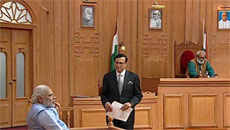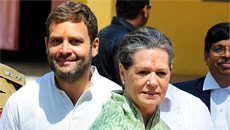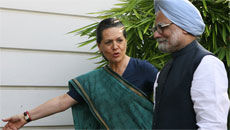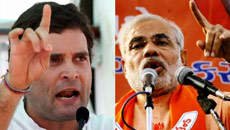Prime Minister Narendra Modi drove the agenda of the BJP-led government in its very first week by his words and actions. As ministers assumed charge of their offices and sought to settle in, not before some courted controversy, Modi asked them to come up with a 100-day plan of action and reply promptly to issues raised by states.
Modi, who began his innings on an unprecedented note by meeting leaders of SAARC countries, also became the first prime minister of the country to make tweets from his own handle, in a message that he would be technologically driven and his belief in the power of communication - a far cry from that of his immediate predecessor.
While his oath-taking Monday was a celebratory event in itself - the largest such hosted by the Rashtrapati Bhavan - Modi heralded a small team which had 45 ministers, including 23 of cabinet rank, though it is widely expected to be expanded next month to fill important ministeral slots like defence.
Widely regarded as a powerful communicator both for his oratorical skills and ability to effectively deliver a message to people, Modi has taken his reputation to the Prime Minister's Office. Modi, who assumed office Tuesday, has already been tweeting about his meetings, his conversations and his views on some topical issues - some of them late in the night before retiring for the day.
A new PMO website was unveiled soon after he was sworn in as India's 15th prime minister. The website, in soothing, appealing colours is elaborate in detail and easy on the eye and carries a prominent photograph of Modi with a pledge to "script a glorious future for India" and build a "strong, developed and inclusive India that actively engages with the world community to strengthen the cause of world peace and development".
While there have been some questions of Modi's choice of ministers and portfolios - Smriti Irani getting human resource development and Jitendra Singh being appointed minister of state in prime minister's office - the government has been dogged by controversies in its first week. Incidentally, both Smriti and Jitendra Singh were at the centre of controversies.
Jitendra Singh dented the sheen of the new government's first day in office by stating the process of discussion had begun on abrogation of Article 370, which provides a special status to Jammu and Kashmir. Though he later issued a clarification, the damage had been done.
Irani was in controversy over her election affidavits having different details of her educational qualification. The Congress was quick to seize the opportunity, reminding her of consequences of lying under oath.

With corruption and black money among BJP's campaign themes, the Modi government, in its first cabinet meeting, decided to form a Special Investigation Team (SIT) to unearth the unaccounted money stashed outside the country.
The first week also saw a determined government bring an ordinance to clear the way for appointment of Nripendra Misra as principal secretary to the prime minister, a move that led to criticism from the Congress, which got a chance to remind the BJP how it had opposed the aborted UPA ordinance against corruption only some months ago.
Misra, who was chosen for "competence and proven integrity", could not have been appointed without change in rules as he had served a former chairman of the Telecom Regulatory Authority of India.
Through his statements in the week, Modi has sought to live up to his formula of "minimum government, maximum governance" by talking about his commitment to change work culture and style of governance. Having pilloried the previous Congress-led government for "policy paralysis", Modi has apparently identified "all important policy issues" as a subject within his remit, giving ample indication that he will be the man in change and the ultimate arbiter of government policies in every area.
With expectations riding high on his pledges of providing good governance, Modi has told his ministers to focus on efficiency, delivery and implementation in government schemes and initiatives. Modi asked the ministers Thursday to prepare their "timetable" for their first 100 days, "decide on priorities" and get going with the issues pending from the previous United Progressive Alliance government.
He told them that the "main issue is good governance" and there was need to focus on it.
Modi has also told the ministers that there should be early response to representations from states and issues raised by MPs should also be viewed with all seriousness and resolved speedily. Modi has also made it clear that the union ministers will have to select their personal staff from the general pool to end the system where officials, sometimes even relatives, could be hand picked.
In another step characteristic of his "hands on approach", Modi Thursday took a round of the PMO, inquiring about functioning of its sections and the facilities available to the staff, a gesture that few prime ministers before him seem to have made. Modi has already sent a message to officials to freely interact with him with their ideas.
Modi, whose rise from humble origins has spawned a series of books and who scripted history by leading the BJP to victory in general elections, initiated a new foreign policy outreach by inviting leaders from SAARC countries for his swearing-in. Pakistani Prime Minister Nawaz Sharif was among the leaders who attended and held talks with Modi, braving criticism from his religious right and reservations from the powerful Pakistani Army.
Senior journalist and political commentator S. Nihal Singh said Modi was trying to negotiate his way through the pulls and pressures of Rashtriya Swayamsevak Sangh, the ideological fountainhead of the BJP.
He said Modi will have to fend off the RSS and difficult allies.

"Everybody is hoping for a more decisive government. PMO is going to be very powerful. I think Modi is playing around with ideas. The expectation is of a more decisive government and hopefully a purposeful one," Nihal Singh told IANS.
Former cabinet secretary Prabhat Kumar said it was too early to talk about the form of governance but early indications were "very promising. "What I am most impressed with is that he has started tackling process related governance (systems and procedures). Policies and programmes can come later," Prabhat Kumar, who was cabinet secretary 1998-2000, told IANS.
He said Modi had talked about continuity in policy and reposing confidence in bureaucracy. He said there was a distrust between the political bosses and executive which Modi was seeking to remove.
Congress leader Raashid Alvi said that it was too early to judge the government but he would be better advised to steer clear of controversial issues including Article 370 and uniform civil code.
"The priorities spelled out by the government do not talk of price rise. It has also not marked a time frame to bring back black money," Alvi told IANS.





